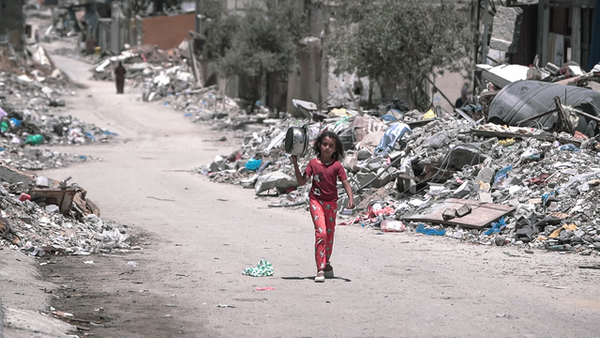Fighting Despair with Understanding
By Gianluigi Gugliermetto
Reprinted from Daily Meditations with Matthew Fox
Last Sunday night, here in Italy, a great number of Catholic churches, from cities to the smallest villages, rung their bells at 10pm — an unusual time —to signify solidarity with the Palestinians who are being killed by an engineered famine. As a friend put it, “At least we feel we are a portion of a hurting whole.”
People may stop caring for the world when they feel that their caring goes nowhere. The good news is that the mounting of international pressure on the Israeli government has obtained some results, such as the allowing of humanitarian aid into Gaza. But what happens when our actions are not met with success and remain — as some would say — “merely symbolic”?
This is a very serious matter in our hyper-capitalist society which can continue to rush towards annihilation precisely because too many people live in the slumber of consumerism or are forced into survival mode. How can we stay awake, active, energetic — even though we are not energized by success in our social action?
Achinoam Nini pauses her concert in Torre Orsaia: “In a few minutes we will hear the church bells ringing throughout Italy in solidarity with all the innocent people in Gaza, the Palestinians and the hostages, men, women, children, who deserve to live in peace.” Facebook reel by Grazia Serra
In his book The Reinvention of Work — probably more than in any other —Matthew Fox has laid out the paradigm of the Green (Sheen) Era in contrast to the paradigm of the Machine Era. As long as we remain “atomized” — that is, we are convinced to be isolated and unrelated — the mechanistic mentality keeps ruling: we believe at some level to be a piece of the Machine, and our occasional attempts at becoming a clog in it are easily frustrated.
But when we perceive ourselves as organically interrelated with everything else, we can successfully counteract our feelings of impotence and despair. No action is “merely symbolical,” all good actions are a contribution to the health of the whole, and we remain strong and ready for more action.

It is not about not feeling despair; it’s about accepting that the suffering and despair of the people in Gaza — and everywhere else human dignity is downtrodden — flows toward us and we can get let it in without being overwhelmed. If we were just a piece of the Machine, we would need to push away the intensity of feelings, in order to preserve ourselves. Each and any mechanical piece can withstand only so much mechanical pressure. We may also fear that the Machine will stop feeding us, or we may perceive that the thread uniting us with distant people is not real or it is weak and irrelevant for our functioning.
Not so when we shift to an understanding of ourselves as organically interrelated. Things change when we start thinking of our own species as an organism which undoubtedly is affected by illnesses in some of its limbs, while often toxins try to rule the day, and yet it can find its strength precisely in its being one interconnected whole.
This has been intuited by poets along the centuries. It is now confirmed by postmodern science and it’s felt by an increasing number of people all around the world. Anglican priest John Donne famously wrote:
No man is an island,
Entire of itself.
Each is a piece of the continent,
A part of the main.
(…)
Each man’s death diminishes me,
For I am involved in mankind.
Therefore, send not to know
For whom the bell tolls,
It tolls for thee.
It is not just because we are fed and sheltered that we can fight for those who are not, although that is a necessary condition. It is because all that happens to them happens under a certain guise also to us, and vice versa. Call it mystical exchange — if you wish — provided that you don’t attach to the phrase the meaning of “mysterious” because there is nothing more plain than such exchanges, once you come to realize it.
Probably I like more the thought of being connected with the trees in my garden, with my pets, and with the mountains in my view than both with hurting people and with horrible people, with the victims and the perpetrators. But all of this is true.
While deepening the understanding of our interrelatedness at all levels is not a panacea for the ills of human society, it is also not a refuge away from political and social action. Instead, when it becomes a strong and constant element of our mindset, it represents a great help to steer the course of our life away from despair.
Return to NEWS
Shem Center for Interfaith Spirituality
708 North Harvey Avenue
Oak Park, IL 60302
(708) 848-1095
shemcenter1993@gmail.com
Photo Credits: Emory Mead, Stephen B. Starr, Joseph Kilikevice
The Shem Center for Interfaith Spirituality website is awarded a 2022 American Digital Design Award for excellence in design and user experience.
